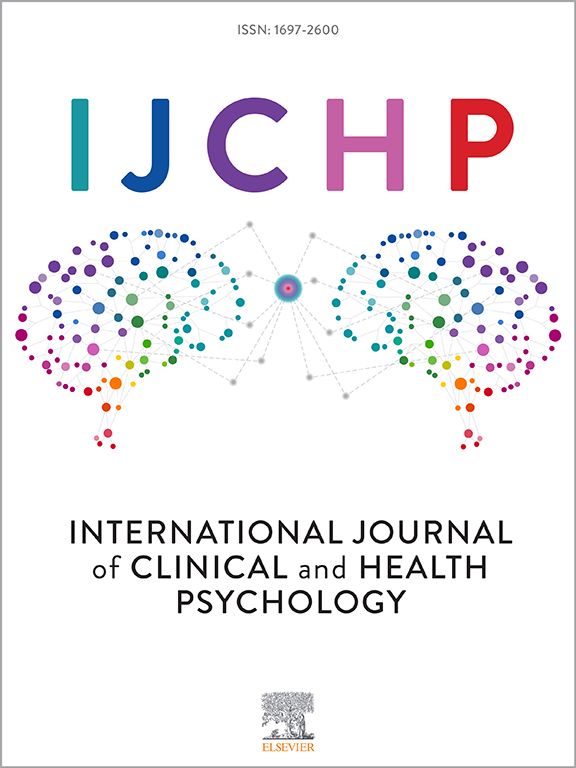Longitudinal relationship between posttraumatic growth and distress in lung cancer patients during neoadjuvant immunotherapy
IF 4.4
1区 心理学
Q1 PSYCHOLOGY, CLINICAL
International Journal of Clinical and Health Psychology
Pub Date : 2025-01-01
DOI:10.1016/j.ijchp.2025.100549
引用次数: 0
Abstract
Purpose
Posttraumatic growth (PTG) has been recognized as beneficial for the emotional well-being of cancer patients. However, the longitudinal relationship between PTG and emotional distress remains unclear and has rarely been investigated among patients undergoing neoadjuvant therapy. We investigated the linear and quadratic longitudinal associations between distress (depression, anxiety, and negative affect) and PTG in lung cancer patients undergoing neoadjuvant immunotherapy. We also tested individual variations in the longitudinal associations.
Methods
Data were pooled from three clinical trials (n = 231) evaluating the efficacy of neoadjuvant immunotherapy in lung cancer patients. At the beginning of each treatment cycle, patients completed questionnaires assessing PTG and distress. Cross-lagged panel analysis was used to evaluate longitudinal associations, and multi-group structural equation modeling was conducted to examine individual variations in these relationships.
Results
A unidirectional linear relationship was observed, with lower levels of distress predicting greater PTG over time. The impact of anxiety on PTG was more pronounced in patients with higher education or lower financial burdens, while the effect of negative affect was more salient in older patients. No significant quadratic effects of distress on PTG were observed.
Conclusions
Lower emotional distress may facilitate the development of PTG over time. The longitudinal effect of distress on PTG varied on age, education, and financial burdens.
Implications
Psychosocial interventions to promote PTG may be more effective by incorporating stress management and emotion regulation strategies, and need to be tailored to patients’ socioeconomic characteristics.
肺癌患者在新辅助免疫治疗期间创伤后生长与痛苦的纵向关系
目的创伤后成长(PTG)有助于癌症患者的情绪健康。然而,PTG与情绪困扰之间的纵向关系尚不清楚,很少在接受新辅助治疗的患者中进行调查。我们研究了接受新辅助免疫治疗的肺癌患者的痛苦(抑郁、焦虑和负面情绪)与PTG之间的线性和二次纵向关联。我们还测试了纵向关联的个体差异。方法汇总3项临床试验(n = 231)的数据,评估新辅助免疫治疗对肺癌患者的疗效。在每个治疗周期开始时,患者完成评估PTG和痛苦的问卷。使用交叉滞后面板分析来评估纵向关联,并使用多组结构方程模型来检查这些关系中的个体差异。结果观察到单向线性关系,随着时间的推移,较低的痛苦水平预示着较高的PTG。焦虑对PTG的影响在受教育程度较高或经济负担较低的患者中更为明显,而消极情绪的影响在年龄较大的患者中更为显著。苦恼对PTG无显著二次效应。结论随着时间的推移,较慢的情绪困扰可能促进PTG的发展。苦恼对PTG的纵向影响因年龄、教育程度和经济负担而异。通过结合压力管理和情绪调节策略,社会心理干预可能更有效地促进PTG,需要根据患者的社会经济特征进行调整。
本文章由计算机程序翻译,如有差异,请以英文原文为准。
求助全文
约1分钟内获得全文
求助全文
来源期刊

International Journal of Clinical and Health Psychology
PSYCHOLOGY, CLINICAL-
CiteScore
10.70
自引率
5.70%
发文量
38
审稿时长
33 days
期刊介绍:
The International Journal of Clinical and Health Psychology is dedicated to publishing manuscripts with a strong emphasis on both basic and applied research, encompassing experimental, clinical, and theoretical contributions that advance the fields of Clinical and Health Psychology. With a focus on four core domains—clinical psychology and psychotherapy, psychopathology, health psychology, and clinical neurosciences—the IJCHP seeks to provide a comprehensive platform for scholarly discourse and innovation. The journal accepts Original Articles (empirical studies) and Review Articles. Manuscripts submitted to IJCHP should be original and not previously published or under consideration elsewhere. All signing authors must unanimously agree on the submitted version of the manuscript. By submitting their work, authors agree to transfer their copyrights to the Journal for the duration of the editorial process.
 求助内容:
求助内容: 应助结果提醒方式:
应助结果提醒方式:


